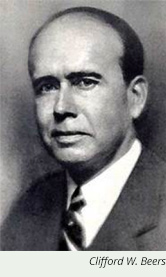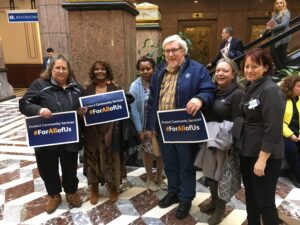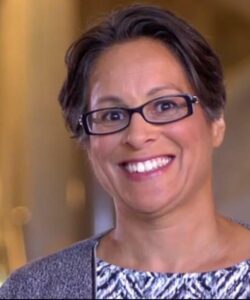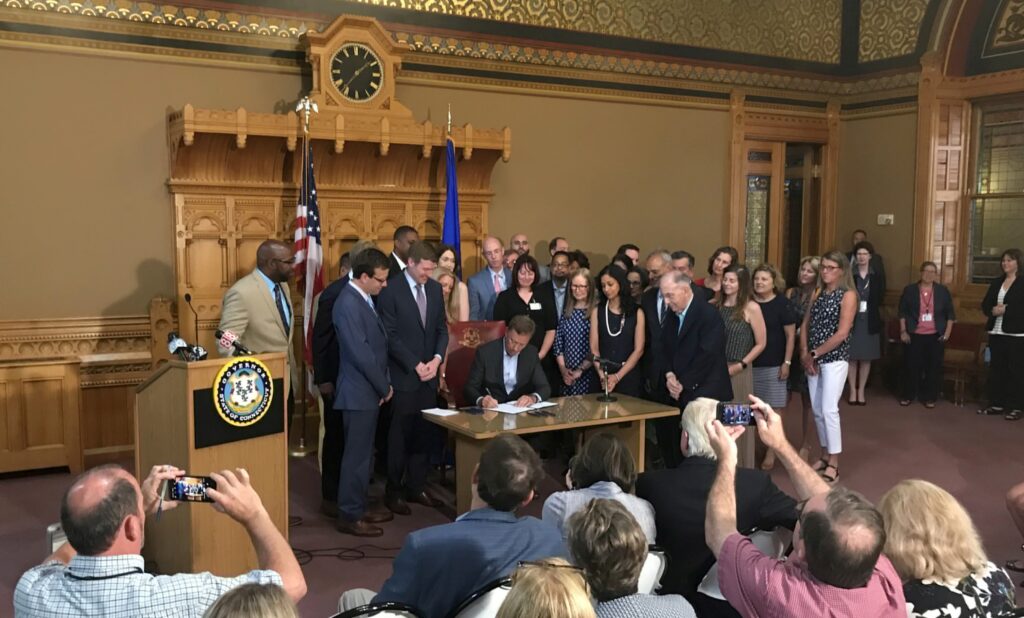by: Suzi Craig
In 2015, I joined Mental Health Connecticut (MHC) and took on a new career challenge. One-third of my role was to run Advocacy efforts at MHC. This meant becoming a registered lobbyist and learning new skills that were completely foreign to me (as well as a bit terrifying).
 Skills aside, I wanted to write about Advocacy as a tool for self-care in one of our #31Tools2Thrive because it’s rarely talked about as a healing process. Today (May 6th) is also MHC’s Founding Day. Today is the day we honor the grandfather of recovery and the reason why MHC’s roots in advocacy run deep: Clifford W. Beers. Also the founder of Mental Health America, Beers’ 1908 memoir A Mind That Found Itself had an immediate impact, launching him from an unknown patient at Connecticut’s state psychiatric hospitals to the highly visible leader of a movement that he created.
Skills aside, I wanted to write about Advocacy as a tool for self-care in one of our #31Tools2Thrive because it’s rarely talked about as a healing process. Today (May 6th) is also MHC’s Founding Day. Today is the day we honor the grandfather of recovery and the reason why MHC’s roots in advocacy run deep: Clifford W. Beers. Also the founder of Mental Health America, Beers’ 1908 memoir A Mind That Found Itself had an immediate impact, launching him from an unknown patient at Connecticut’s state psychiatric hospitals to the highly visible leader of a movement that he created.
In non-pandemic times, MHC rallies program participants to come to the Capitol in Hartford and share their story in person, during public hearings and in meetings with legislators. The exchange between legislator and one of their constituents is our democratic process in action.
So, how is that healing?

MHC advocates from the Independence Center and Suzi Craig, far right, at the Capitol in 2017
The excitement of being a part of legislative decision-making is palpable and I’ve seen it have a lasting effect on our program participants, increasing their hope and reinforcing their ability to make a difference. For individuals with lived experience, self-advocacy has been shown to be an essential part of the recovery process. For legislators, hearing how a piece of legislation plays out in the world is invaluable to their decision-making. For me, being able to represent MHC and educate legislators and other advocates keeps me going, especially on the days when it’s hard to know if anyone is listening.
Sitting in public hearings I’ve seen legislators get emotional, I’ve heard them thank people and publicly state that they needed to rethink their position, and I’ve heard them ask questions that showed they were truly listening to someone’s story. All of these responses have a direct impact on the wellbeing of the person testifying.
In Connecticut, when you testify at a public hearing in favor of or against a bill, you have three minutes. That may not seem like a long time but when someone has a brave story to tell or can shed some light on an issue that has not yet been shared, three minutes is enough time to change someone’s mind. I’ve seen it happen before my eyes.
One of my mentors and fellow advocates is Kathy Flaherty, Executive Director of Connecticut Legal Rights Project (CLRP). I’ve seen Kathy testify many times and each time I marvel at how she is able to wield various moving parts — her expertise as a lawyer and with clients, her personal story of lived experience, and her knowledge of the “other side” — into three minutes that makes a difference.
I asked Kathy to share her insight about advocacy. Her thoughts reminded me that advocacy can have a great impact in a multitude of ways, beyond the public hearing forum.

Kathy Flaherty, CLRP
“Everyone has a voice, but not everyone is listened to. I’m still learning how to listen more and boost other voices. There is power in community; know that you are not alone. There are many ways to be involved in advocacy; not all of us like the spotlight, and it’s not necessary to be on center stage to be an effective advocate. Often, it is those quiet, behind-the-scenes, one-on-one conversations or email exchanges, that make the difference in changing people’s hearts and minds. Find a way to get involved, and be part of the change you want to see in the world. If you don’t do it, someone else likely will, and they may or may not be advocating for the things you want. If this sounds like I’ve borrowed from a whole lot of people who are wiser and pithier than I, it’s because I did.” – Kathy Flaherty, Connecticut Legal Rights Project (CLRP)
I wish I could have heard Beers’ conversations with legislators, members of high society (of which his family belonged), the press, and anyone who would listen. I imagine hearing gasps and seeing shocked faces as Beers explained of his mistreatment. I also like to think that there were many moments of surprise and interest as Beers convinced people that, like him, there were many, many others who belonged in the community and who needed their support to live a life of recovery, not one of being shunned out of society.
I once took a tour of Connecticut Valley Hospital (CVH) and the cemetery is one part of that campus I will never forget. All the gravestones have numbers — no names, no date of birth/death, no memorials. Why? Because when individuals died their families did not want the family name listed on the gravestones. CVH now has a memorial lists the numbered gravestones with the persons name.
It’s important to know that an advocate is responsible for why that memorial exists and why someone can find where their ancestor is buried. It was one person and probably a whole group of people who stood up and said, “this needs to change.”
But, as Kathy reminds us, the everyday work of advocacy is just as important as the big wins. If you are interested in using your voice to make change, here are the healing benefits that I’ve experienced and, in my conversations with others have experienced as well:
- Expressing yourself and sharing your direct experience and views, and then being heard by others, creates human connection
- Working on something that is bigger than yourself, that you know will impact others, is motivating to create a deeper impact on your community and brings a sense of purpose to your life
- When others know you are an advocate, they will reach out to you, allowing you to see and feel that your work is reaching more people
The act of sharing your personal story or letting others know how an idea will impact the people in our community is energizing alters our neurochemical processes — one way is through the release of dopamine when we experience an emotionally charged event, which also increases memory function and reinforces the idea of repeating the experience
If you’re interested in getting involved in advocacy, here are some tips to get started:
- What issue are you passionate about? Issues that you have direct experience with, care about, and have knowledge on are the best place to start
- Why should someone else care about this issue? Always establish your talking points and do your homework before talking to a legislator — other advocates can help with this so finding coalitions or groups who are passionate about the issues you are is a great starting place
- What is your your “Ask”? Identify what you want to have happen when you talk about the issue; you don’t need to have all the answers but you should have a vision in your mind for how things should change
- Who are your lawmakers? Finding your Connecticut lawmakers is easy when you search by town on the CGA website; a quick Google search will tell you who your Federal delegates are
- Is there a proposed bill or hot button issue that you can get involved with right now? The only way to make a difference is to start making a difference!
For my part, when I talk to legislators about the bills that will impact MHC staff and program participants, the work is eternally gratifying. And, when we have a win, it makes the hours of learning about all angles of an issue, working with other advocates, sending emails, making phone calls, and on and on, all worth it.
I see advocacy as another form of education. And, if you and I won’t share what we know and why it’s important with others, who will?

Governor Ned Lamont signing the 2019 CT parity law for private health insurance benefits. MHC helped lead the CT Parity Coalition which supported the success of the passing of this law.

